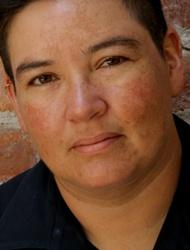Marcia Ochoa
Marcia Ochoa | |
|---|---|
 Marcia Ochoa | |
| Born | 9 September 1970 |
| Known for | Latino Studies, Transgender studies, Queer theory, Ethnography, "Perverse Citizenship"[2] |
| Academic background | |
| Alma mater | Stanford University (Ph.D.)[1] |
| Doctoral advisor | Purnima Mankekar and Renato Rosaldo |
| Academic work | |
| Institutions | University of California, Santa Cruz Stanford University |
Marcia Ochoa (born 9 September 1970) is a United States-based professor of Feminist Studies and Critical Race and Ethnic Studies at the University of California, Santa Cruz.[3] They are the co-founder of El/La Para TransLatinas and is credited with popularizing the term "translatina."[4]
Life
[edit]Ochoa moved to San Francisco in 1994.[5] They co-founded El/La Para TransLatinas in 2006 in San Francisco, California.[6]
Career
[edit]Ochoa completed her Ph.D. at Stanford University in Anthropology in 2005.[7] She began teaching at the University of California, Santa Cruz in 2005, chaired the Feminist Studies department from 2014 to 2017, and currently serves as Provost of Oakes College. She is also a professor of Critical Race and Ethnic Studies, Social Documentation, Anthropology, Latin American & Latino Studies, and Film and Digital Media.[3]
She published her first book based on her dissertation, Queen for a Day: Transformistas, Beauty Queens and the Performance of Femininity in Venezuela, in 2014 through Duke University Press.[8] It was nominated for a Lambda Literary Award.[9] That same year, she edited the Transgender Studies Quarterly issue "Decolonizing the Transgender Imaginary".[10] She is currently the editor of GLQ: A Journal of Lesbian and Gay Studies.[11][12]
Following the publication of Queen for a Day, Ochoa's work focused on early colonial violence in Latin America.[13]
References
[edit]- ^ Asencio, Marysol (2009). Latina/o Sexualities: Probing Powers, Passions, Practices, and Policies. Rutgers, NJ: Rutgers University Press.
- ^ Ochoa, Marcia (2008-12-14). "Perverse Citizenship: Divas, Marginality, and Participation in "Loca-Lization"". WSQ: Women's Studies Quarterly. 36 (3): 146–169. doi:10.1353/wsq.0.0102. ISSN 1934-1520. S2CID 85321671.
- ^ a b "Marcia Ochoa". lals.ucsc.edu. Retrieved 2018-01-13.
- ^ Miguel, Yolanda Martínez-San, and Sarah Tobias. Trans Studies: The Challenge to Hetero/Homo Normativities. Rutgers University Press, 2016.
- ^ "Marcia Ochoa | OUT/LOOK & the Birth of the Queer". OUT/LOOK & the Birth of the Queer. Retrieved 2018-01-13.
- ^ "El/La Para TransLatinas". ellaparatranslatinas.yolasite.com. Retrieved 2018-01-13.
- ^ Ochoa, Marcia (2014). Queen for a day: Transformistas, Misses and Mass Media in Venezuela. Stanford, CA: Stanford University.
- ^ Ochoa, Marcia (2014). Queen for a Day: Transformistas, Beauty Queens, and the Performance of Femininity in Venezuela. Durham, NC: Duke University Press.
- ^ Kellogg, Carolyn (2015-06-02). "Lambda Literary Awards laud best gay, lesbian and transgender books". Los Angeles Times. ISSN 0458-3035. Retrieved 2018-01-13.
- ^ Aizura, Aren Z.; Ochoa, Marcia; Cotton, Trystan; Vidal-Ortiz, Salvador (2014). Decolonizing the Transgender Imaginary. Duke University Press. ISBN 978-0822368175.
- ^ "GLQ | Duke University Press". read.dukeupress.edu. Retrieved 2018-01-13.
- ^ "An Interview with Marcia Ochoa: How She Envisions the Future of GLQ". Duke University Press News. 2015-06-25. Retrieved 2018-01-13.
- ^ "Los Huecos Negros: Cannibalism, Sodomy and the Failure of Modernity in Tierra Firme | Genders | University of Colorado Boulder". www.colorado.edu. Retrieved 2018-01-13.
